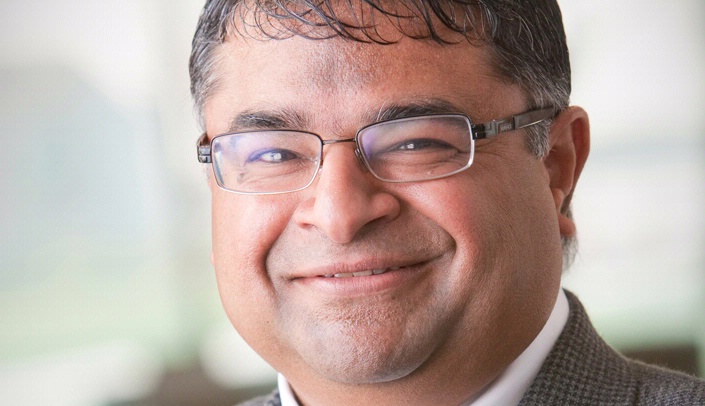Chandran Achutan, Ph.D., C.I.H.Jonathan Ali is a third year Ph.D. student in Environmental Health, Occupational Health & Toxicology at UNMC. During the course of his studies, which focus on aquatic toxicology, he's been to Chile to explore agricultural runoff. "Our researchers do a lot of lab-based research, but we also do a lot of field research," said Chandran Achutan, Ph.D., C.I.H., director of the graduate program. "Students work hands-on with faculty right from day one. We give them a lot of practical experience, whether its lab-based research or going out into the field. Our classes were designed so students have an opportunity to go out and do some field work, just to get a sampling of what they can do down the road." The lab-based research in the program includes work in the field of pulmonary health, particularly asthma outcomes in farmers, breast cancer and endocrine disorders. The aquatic toxicity research includes field work exploring fish in the Elkhorn River valley, trying to make the link between pollutants in the water and how it could be toxic to fish. "Then you have the more applied research people, like me," Dr. Achutan said. "We do more work with looking at industrial hygiene and safety, or ergonomics research. One of my projects right now is looking at noise and hearing loss in farmers." The hearing conservation project is one focus of the Central States Center for Agricultural Safety and Health (CS-CASH), which is working with the state to raise awareness of farming's dangers to hearing. Because of loud machinery, "almost all farmers end up with hearing loss," said Eleanor Rogan, Ph.D., chair of the Department of Environmental, Agricultural and Occupational Health in the UNMC College of Public Health. The department houses both the CS-CASH and the Center for Environmental Health & Toxicology, as well as the Ph.D. program in Environmental Health, Occupational Health & Toxicology. This provides a multitude of resources that facilitate graduate student training. The program is very collaborative, one of the reasons Ali enjoys it. "I know everyone loves to throw around that word on every campus, but getting to see how people from my department collaborate, not just with other departments in the college — I've seen them work with other faculty and people outside the university system, and all the way down to Lincoln," he said. "I've seen them having to balance their research needs against the non-academic needs of their collaborators, and they've been really open with me as a student about that experience." Students, faculty and staff also often take part in outreach activities, Dr. Achutan said. "We have a very strong outreach program where we go out and talk to kids about hearing loss and respiratory health," he said. "We give samples of respirators and hearing protection to kids and families. That's faculty, staff and students." "That comprises a lot of what we do — research, services and outreach across Nebraska and surrounding states," said Dr. Rogan. Faculty associated with the Ph.D. program have a wide variety of research interests – not just those involving the CS-CASH. For example, John Lowe, Ph.D., is active with the Biocontainment Unit and the National Ebola Training & Education Center. Others interact with the Daugherty Water for Food Institute in looking at the effects of agrichemicals and other land use throughout the state on public health, as well as looking at contamination of waterways and getting people involved to think about their waterways. "The Elkhorn River has 1,000 confined animal feed operations on it as it comes through Nebraska, and that leads to contamination. There's also agricultural runoff, so there's a fair amount of pollution in the Elkhorn," Dr. Rogan said. Dr. Achutan recently returned from Indonesia. "That was part of a unique global health fellowship," he said. "But we've also gone to farms for classes. We've taken students out to the Nebraska Historical Society because the people there wanted to know the levels of chemicals they are being exposed in the artwork restoration process. We're currently discussing the possibility of our students working with the Omaha Healthy Kids Alliance. We have a project going on with them where we're looking at how to improve the education of Latinos in Omaha relative to how to keep their homes clean and healthy." The result, Ali said, is a Ph.D. program with a lot of opportunity. "I'm getting the most out of my experience here," he said. "It's really helped having faculty from such different backgrounds to challenge me."
Ph.D. program spotlight: Environmental Health, Occupational Health & Toxicology
By the numbers
- Program profile: Ph.D. in Environmental Health, Occupational Health & Toxicology
- Program director: Chandran Achutan, Ph.D., C.I.H.
- Program began: 1999
- Available degree tracks: Environmental & Occupational Hygiene Track; Occupational Biomechanics Track; Toxicology Track.
- Average time to degree: 3.75 years
Seventeen students have completed the Ph.D. program, and seven students are currently enrolled.
